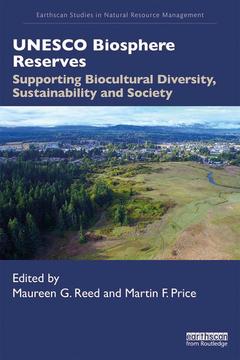UNESCO Biosphere Reserves Supporting Biocultural Diversity, Sustainability and Society Earthscan Studies in Natural Resource Management Series
Coordonnateurs : Reed Maureen G., Price Martin F.

UNESCO Biosphere Reserves (BRs) are designated areas in geographical regions of global socio-ecological significance. This definitive book shows their global relevance and contribution to environmental protection, biocultural diversity and education.
Initiated in the 1970s as part of UNESCO?s Man and Biosphere (MAB) Programme, BRs share a set of common objectives, to support and demonstrate a balance between biodiversity conservation, sustainable development and research. The world?s 701 BRs form an international, intergovernmental network to support the aims of sustainability science, but this purpose has not always been widely understood. In three distinct sections, the book starts by outlining the origins of BRs and the MAB Programme, showing how they contribute to advancing sustainable development. The second section documents the evolution of BRs around the world, including case studies from each of the five UNESCO world regions. Each case study demonstrates how conservation, sustainable development and the role of scientific research have been interpreted locally. The book concludes by discussing thematic lessons to help understand the challenges and opportunities associated with sustainability science, providing a unique platform from which lessons can be learned. This includes how concepts become actions on the ground and how ideas can be taken up across sites at differing scales.
This book will be of great interest to professionals engaged in conservation and sustainable development, NGOs, policy-makers and advanced students in environmental management, ecology, sustainability science, environmental anthropology and geography.
1. Introducing UNESCO Biosphere Reserves Part I Conceptual and Practical Foundations of the International Man and Biosphere Programme 2. Conceptual Origins and First-Generation Biosphere Reserves 3. Biosphere Reserves from Seville, 1995 to 2030: A Global Network of Sites of Excellence to Address Regional and Global Imperatives Part II Translation and Transitions: The Changing Practices of Biosphere Reserves 4. The Mexican Biosphere Reserves: Landscape and Sustainability 5. The Chilean Biosphere Reserves Network as a Model for Sustainability?: Challenges Towards Regenerative Development, Education, Biocultural Ethics and Eco-social Peace 6. Perspectives on Growth and Change in Canada’s 18 UNESCO Biosphere Reserves 7. The Evolution of Biosphere Reserves in the United Kingdom 8. Meeting the Challenge of Sustainable Development in Biosphere Reserves: Analyzing the Knowledge Used to Establish Swedish Biosphere Reserves 9. The French Biosphere Reserves: Looking for Ecological Solidarity and Stewardship 10. The More Institutional Models, the More Challenges: Biosphere Reserves in the Czech Republic 11. Sense and Sustainability: The Story of Biosphere Reserves in Lebanon 12. Adapting to Socio-ecological Pressures Using Sustainability Science in Egyptian Biosphere Reserves 13. Sustainability at the Centres of Origin: Lessons from UNESCO Biosphere Reserves in Ethiopia 14. Innovative Implementation of the UNESCO MAB Programme in South Africa: Towards the Advancement of Sustainable Landscapes 15. Transdisciplinary Approaches for the Reactivation of Japanese Biosphere Reserves 16. Biosphere Reserves in Vietnam: Management Challenges 17. Man and the Biosphere Programme in China: Sustaining the Community of Life over Four Decades 18. The Four Stages of Biosphere Reserves in Australia: A Retro-and Prospective Part III: Lessons for Sustainability Science and Sustainability in Practice 19. Integrating Science and Local Knowledge to Strengthen Biosphere Reserve Management 20. Biosphere Reserves, Ideal Sites to Implement Holistic Approaches in Regenerative Development 21. Co-creation of Sustainable Development Knowledge in Biosphere Reserves 22. Implementation of Social-ecological Management Approaches in Biosphere Reserves in the Mediterranean Basin 23. Participatory Learning for Transdisciplinary Science in Biosphere Regions: A Modified Role for Universities 24. Embracing Cultures in Ecosystem Governance in Biosphere Reserves: Slowing Down the Pace 25. Unfinished Business: The Present and Future Contributions of Biosphere Reserves to Sustainability Science
Maureen G. Reed is Professor and Assistant Director of the School of Environment and Sustainability, University of Saskatchewan, Canada. She is UNESCO (co)-Chair in Biocultural Diversity, Sustainability, Reconciliation and Renewal.
Martin F. Price is Professor and Director of the Centre for Mountain Studies, Perth College, University of the Highlands and Islands, UK. Since 2009 he has held the UNESCO Chair in Sustainable Mountain Development.
Date de parution : 09-2019
15.6x23.4 cm
Date de parution : 09-2019
15.6x23.4 cm
Thèmes d’UNESCO Biosphere Reserves :
Mots-clés :
Nothofagus Dombeyi; UNESCO; Oromia National Regional State; Biosphere Reserves; National Sustainable Development Goals; sustainability science; Cabo De Hornos; sustainable development; Cat Ba Biosphere Reserve; biodiversity; UNESCO Biosphere Reserve; BRs; MAB Programme; conservation; BR; biocultural diversity; BR Concept; transdisciplinarity; Socio-economic Development; interdisciplinarity; BR Manager; Man and Biosphere Programme; (MAB) Programme; National Committee; Biosphere Reserve Model; policy; Seville Strategy; Montes Azules; environmental protection; BR Network; sustainability; SES Framework; education; Local NGO; ecosystem; Site Selection; ecology; UNESCO Association; environment; Di Castri; Ecosystem Governance; Selva Lacandona; Social Ecological Approaches



